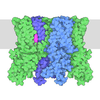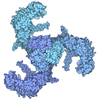[English] 日本語
 Yorodumi
Yorodumi- PDB-8u3j: TRPV1 in nanodisc bound with empty vanilloid binding pocket at 4C -
+ Open data
Open data
- Basic information
Basic information
| Entry | Database: PDB / ID: 8u3j | |||||||||
|---|---|---|---|---|---|---|---|---|---|---|
| Title | TRPV1 in nanodisc bound with empty vanilloid binding pocket at 4C | |||||||||
 Components Components | Transient receptor potential cation channel subfamily V member 1 TRPV1 TRPV1 | |||||||||
 Keywords Keywords |  MEMBRANE PROTEIN / MEMBRANE PROTEIN /  TRPV1 in nanodisc bound with empty vanilloid binding pocket at 4C TRPV1 in nanodisc bound with empty vanilloid binding pocket at 4C | |||||||||
| Function / homology |  Function and homology information Function and homology informationtemperature-gated ion channel activity / response to capsazepine / excitatory extracellular ligand-gated monoatomic ion channel activity / negative regulation of establishment of blood-brain barrier / sensory perception of mechanical stimulus / peptide secretion / urinary bladder smooth muscle contraction / detection of chemical stimulus involved in sensory perception of pain / cellular response to temperature stimulus / smooth muscle contraction involved in micturition ...temperature-gated ion channel activity / response to capsazepine / excitatory extracellular ligand-gated monoatomic ion channel activity / negative regulation of establishment of blood-brain barrier / sensory perception of mechanical stimulus / peptide secretion / urinary bladder smooth muscle contraction / detection of chemical stimulus involved in sensory perception of pain / cellular response to temperature stimulus / smooth muscle contraction involved in micturition /  TRP channels / cellular response to acidic pH / TRP channels / cellular response to acidic pH /  thermoception / fever generation / detection of temperature stimulus involved in thermoception / glutamate secretion / dendritic spine membrane / negative regulation of systemic arterial blood pressure / chloride channel regulator activity / response to pH / monoatomic cation transmembrane transporter activity / cellular response to ATP / response to pain / thermoception / fever generation / detection of temperature stimulus involved in thermoception / glutamate secretion / dendritic spine membrane / negative regulation of systemic arterial blood pressure / chloride channel regulator activity / response to pH / monoatomic cation transmembrane transporter activity / cellular response to ATP / response to pain /  temperature homeostasis / negative regulation of heart rate / cellular response to alkaloid / behavioral response to pain / diet induced thermogenesis / extracellular ligand-gated monoatomic ion channel activity / intracellularly gated calcium channel activity / cellular response to cytokine stimulus / negative regulation of mitochondrial membrane potential / detection of temperature stimulus involved in sensory perception of pain / calcium ion import across plasma membrane / ligand-gated monoatomic ion channel activity / monoatomic cation channel activity / sensory perception of pain / response to organonitrogen compound / temperature homeostasis / negative regulation of heart rate / cellular response to alkaloid / behavioral response to pain / diet induced thermogenesis / extracellular ligand-gated monoatomic ion channel activity / intracellularly gated calcium channel activity / cellular response to cytokine stimulus / negative regulation of mitochondrial membrane potential / detection of temperature stimulus involved in sensory perception of pain / calcium ion import across plasma membrane / ligand-gated monoatomic ion channel activity / monoatomic cation channel activity / sensory perception of pain / response to organonitrogen compound /  phosphatidylinositol binding / monoatomic ion transmembrane transport / cellular response to nerve growth factor stimulus / phosphatidylinositol binding / monoatomic ion transmembrane transport / cellular response to nerve growth factor stimulus /  phosphoprotein binding / calcium ion transmembrane transport / microglial cell activation / phosphoprotein binding / calcium ion transmembrane transport / microglial cell activation /  calcium channel activity / lipid metabolic process / response to peptide hormone / cellular response to growth factor stimulus / positive regulation of nitric oxide biosynthetic process / calcium ion transport / transmembrane signaling receptor activity / cellular response to heat / cellular response to tumor necrosis factor / positive regulation of cytosolic calcium ion concentration / response to heat / calcium channel activity / lipid metabolic process / response to peptide hormone / cellular response to growth factor stimulus / positive regulation of nitric oxide biosynthetic process / calcium ion transport / transmembrane signaling receptor activity / cellular response to heat / cellular response to tumor necrosis factor / positive regulation of cytosolic calcium ion concentration / response to heat /  postsynaptic membrane / protein homotetramerization / postsynaptic membrane / protein homotetramerization /  calmodulin binding / neuron projection / positive regulation of apoptotic process / external side of plasma membrane / neuronal cell body / calmodulin binding / neuron projection / positive regulation of apoptotic process / external side of plasma membrane / neuronal cell body /  dendrite / negative regulation of transcription by RNA polymerase II / dendrite / negative regulation of transcription by RNA polymerase II /  ATP binding / ATP binding /  membrane / identical protein binding / membrane / identical protein binding /  metal ion binding / metal ion binding /  plasma membrane plasma membraneSimilarity search - Function | |||||||||
| Biological species |   Rattus norvegicus (Norway rat) Rattus norvegicus (Norway rat) | |||||||||
| Method |  ELECTRON MICROSCOPY / ELECTRON MICROSCOPY /  single particle reconstruction / single particle reconstruction /  cryo EM / Resolution: 2.9 Å cryo EM / Resolution: 2.9 Å | |||||||||
 Authors Authors | Arnold, W.R. / Julius, D. / Cheng, Y. | |||||||||
| Funding support |  United States, 2items United States, 2items
| |||||||||
 Citation Citation |  Journal: Nat Struct Mol Biol / Year: 2024 Journal: Nat Struct Mol Biol / Year: 2024Title: Structural basis of TRPV1 modulation by endogenous bioactive lipids. Authors: William R Arnold / Adamo Mancino / Frank R Moss / Adam Frost / David Julius / Yifan Cheng /  Abstract: TRP ion channels are modulated by phosphoinositide lipids, but the underlying structural mechanisms remain unclear. The capsaicin- and heat-activated receptor, TRPV1, has served as a model for ...TRP ion channels are modulated by phosphoinositide lipids, but the underlying structural mechanisms remain unclear. The capsaicin- and heat-activated receptor, TRPV1, has served as a model for deciphering lipid modulation, which is relevant to understanding how pro-algesic agents enhance channel activity in the setting of inflammatory pain. Identification of a pocket within the TRPV1 transmembrane core has provided initial clues as to how phosphoinositide lipids bind to and regulate the channel. Here we show that this regulatory pocket in rat TRPV1 can accommodate diverse lipid species, including the inflammatory lipid lysophosphatidic acid, whose actions are determined by their specific modes of binding. Furthermore, we show that an empty-pocket channel lacking an endogenous phosphoinositide lipid assumes an agonist-like state, even at low temperature, substantiating the concept that phosphoinositide lipids serve as negative TRPV1 modulators whose ejection from the binding pocket is a critical step toward activation by thermal or chemical stimuli. | |||||||||
| History |
|
- Structure visualization
Structure visualization
| Structure viewer | Molecule:  Molmil Molmil Jmol/JSmol Jmol/JSmol |
|---|
- Downloads & links
Downloads & links
- Download
Download
| PDBx/mmCIF format |  8u3j.cif.gz 8u3j.cif.gz | 712.7 KB | Display |  PDBx/mmCIF format PDBx/mmCIF format |
|---|---|---|---|---|
| PDB format |  pdb8u3j.ent.gz pdb8u3j.ent.gz | 601.5 KB | Display |  PDB format PDB format |
| PDBx/mmJSON format |  8u3j.json.gz 8u3j.json.gz | Tree view |  PDBx/mmJSON format PDBx/mmJSON format | |
| Others |  Other downloads Other downloads |
-Validation report
| Arichive directory |  https://data.pdbj.org/pub/pdb/validation_reports/u3/8u3j https://data.pdbj.org/pub/pdb/validation_reports/u3/8u3j ftp://data.pdbj.org/pub/pdb/validation_reports/u3/8u3j ftp://data.pdbj.org/pub/pdb/validation_reports/u3/8u3j | HTTPS FTP |
|---|
-Related structure data
| Related structure data |  41864MC 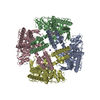 8t0cC 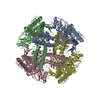 8t0eC 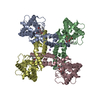 8t0yC 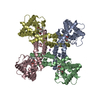 8t10C 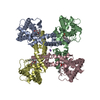 8t3lC 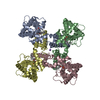 8t3mC 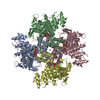 8u2zC 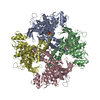 8u30C 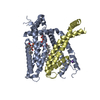 8u3aC 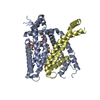 8u3cC 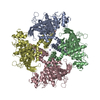 8u3lC 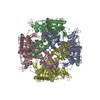 8u43C 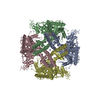 8u4dC M: map data used to model this data C: citing same article ( |
|---|---|
| Similar structure data | Similarity search - Function & homology  F&H Search F&H Search |
- Links
Links
- Assembly
Assembly
| Deposited unit | 
|
|---|---|
| 1 |
|
- Components
Components
| #1: Protein |  TRPV1 TRPV1Mass: 61557.422 Da / Num. of mol.: 4 Source method: isolated from a genetically manipulated source Source: (gene. exp.)   Rattus norvegicus (Norway rat) / Gene: Trpv1 / Production host: Rattus norvegicus (Norway rat) / Gene: Trpv1 / Production host:   Homo sapiens (human) / References: UniProt: O35433 Homo sapiens (human) / References: UniProt: O35433#2: Chemical | ChemComp-3PH /  Phosphatidic acid Phosphatidic acid#3: Chemical | ChemComp-NA / | #4: Water | ChemComp-HOH / |  Water WaterHas ligand of interest | N | |
|---|
-Experimental details
-Experiment
| Experiment | Method:  ELECTRON MICROSCOPY ELECTRON MICROSCOPY |
|---|---|
| EM experiment | Aggregation state: PARTICLE / 3D reconstruction method:  single particle reconstruction single particle reconstruction |
- Sample preparation
Sample preparation
| Component | Name: TRPV1 in nanodisc with empty vanilloid binding pocket at 4C Type: COMPLEX / Entity ID: #1 / Source: RECOMBINANT |
|---|---|
| Molecular weight | Value: 0.688 MDa / Experimental value: NO |
| Source (natural) | Organism:   Rattus norvegicus (Norway rat) Rattus norvegicus (Norway rat) |
| Source (recombinant) | Organism:   Homo sapiens (human) Homo sapiens (human) |
| Buffer solution | pH: 7.5 |
| Specimen | Conc.: 2.1 mg/ml / Embedding applied: NO / Shadowing applied: NO / Staining applied : NO / Vitrification applied : NO / Vitrification applied : YES : YES |
Vitrification | Cryogen name: ETHANE |
- Electron microscopy imaging
Electron microscopy imaging
| Experimental equipment |  Model: Titan Krios / Image courtesy: FEI Company |
|---|---|
| Microscopy | Model: FEI TITAN KRIOS |
| Electron gun | Electron source : :  FIELD EMISSION GUN / Accelerating voltage: 300 kV / Illumination mode: SPOT SCAN FIELD EMISSION GUN / Accelerating voltage: 300 kV / Illumination mode: SPOT SCAN |
| Electron lens | Mode: BRIGHT FIELD Bright-field microscopy / Nominal defocus max: 2000 nm / Nominal defocus min: 800 nm Bright-field microscopy / Nominal defocus max: 2000 nm / Nominal defocus min: 800 nm |
| Image recording | Electron dose: 60 e/Å2 / Film or detector model: GATAN K3 BIOQUANTUM (6k x 4k) |
- Processing
Processing
CTF correction | Type: PHASE FLIPPING AND AMPLITUDE CORRECTION | ||||||||||||||||||||||||
|---|---|---|---|---|---|---|---|---|---|---|---|---|---|---|---|---|---|---|---|---|---|---|---|---|---|
| Symmetry | Point symmetry : C4 (4 fold cyclic : C4 (4 fold cyclic ) ) | ||||||||||||||||||||||||
3D reconstruction | Resolution: 2.9 Å / Resolution method: FSC 0.143 CUT-OFF / Num. of particles: 37836 / Symmetry type: POINT | ||||||||||||||||||||||||
| Refine LS restraints |
|
 Movie
Movie Controller
Controller















 PDBj
PDBj